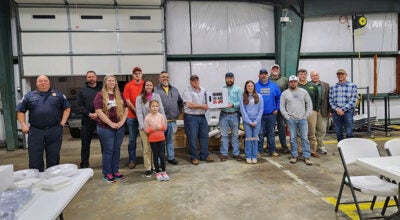Q&A session to be held on correctional center
Published 10:10 pm Friday, January 4, 2019

- The map shows where a proposed 60-bed juvenile correctional facility could be located on Route 258, about a mile south of Windsor. Wetlands are also indicated in the area shaded in blue.
|
Getting your Trinity Audio player ready...
|
WINDSOR
On Thursday, Jan. 10, Isle of Wight County residents will, for the first time, have the opportunity to ask questions of state and county representatives regarding a 60-bed juvenile correctional facility, which is proposed to be located in Phase III of the county’s Shirley T. Holland Intermodal Park.
Two public information sessions, one from 3 to 5 p.m. and the other from 6 to 8 p.m., will each be in the Windsor Town Center, located behind Georgie D. Tyler Middle School at 23361 Courthouse Highway. Representatives from the county and the Virginia Department of Juvenile Justice will present up-to-date plans for the facility, including security arrangements, employment opportunities, programming and a construction timeline.
According to Assistant County Administrator Don Robertson, Andrew Block, director of the Virginia Department of Juvenile Justice, will describe the center, its security system and what will occur there in terms of rehabilitation. County Administrator Randy Keaton and law enforcement officials will also attend, and respond to questions during the question-and-answer period. Residents can choose to attend the afternoon or evening presentations, which will be identical.
The site that the county has identified for the correctional center is located off of Walters Highway (U.S. Route 258) approximately one mile south of the town of Windsor. Approximately 20 acres would be needed for the correctional center.
In November 2018, the county met with representatives of the Army Corps of Engineers to request a new wetlands determination for the site. Earlier that year, the county hired an environmental consultant, Kimley-Horn, to evaluate the site and others in the intermodal park for any environmental issues that might preclude development. Kimley-Horn’s report revealed the presence of wetlands throughout much of the proposed third phase. In December, the Corps of Engineers confirmed a new wetlands determination for 59.8 acres, 32 of which are confirmed wetlands.
According to Robertson, the facility would house youth ages 14 to 20 who have been convicted of various crimes and live primarily in the Hampton Roads area. It would be the first of several smaller centers the DJJ intends to build across the state to replace its larger Bon Air detention facility in Chesterfield County. County and state officials had previously remarked that the center would house juveniles convicted of crimes ranging from misdemeanor drug offenses to murder.
“The goal is to bring residents closer to their families,” Robertson said.
State and county officials had previously indicated that this facility would be designed more like a school campus than a typical prison, meaning it would include academic and vocational education facilities, athletic facilities and counseling services for the juvenile population. It will still be fenced, however, and will include the latest security features, according to Robertson. It is anticipated to employ up to 240 people with an average salary of $60,000.
The county first made public its plans for the facility in July 2018. The Tidewater News and Windsor Weekly reported at the time that all prior discussions among the county, town, economic development authority and state, including the county’s decision on Feb. 28 to send a formal proposal to the DJJ for locating the facility in Isle of Wight, had been done in closed session.
Robertson, in July 2018, had explained that no public hearing was necessary prior to the Board of Supervisors giving its assent for the correctional center to come to the county. This was because the county government does not own the available land in the intermodal park, and, at the time the board sent its proposal, it was uncertain if the state was planning to move forward with the project. The land is actually owned by the Isle of Wight Economic Development Authority. To date, the EDA has not voted on whether to donate any parcels to the state. If it is determined that the EDA must transfer the land to the county before it can be deeded to the state, a public hearing will need to be held before this is done.
A previous public information session was held shortly after the county’s plans became public, but no questions were taken from residents who were not county or town officials at that time.




